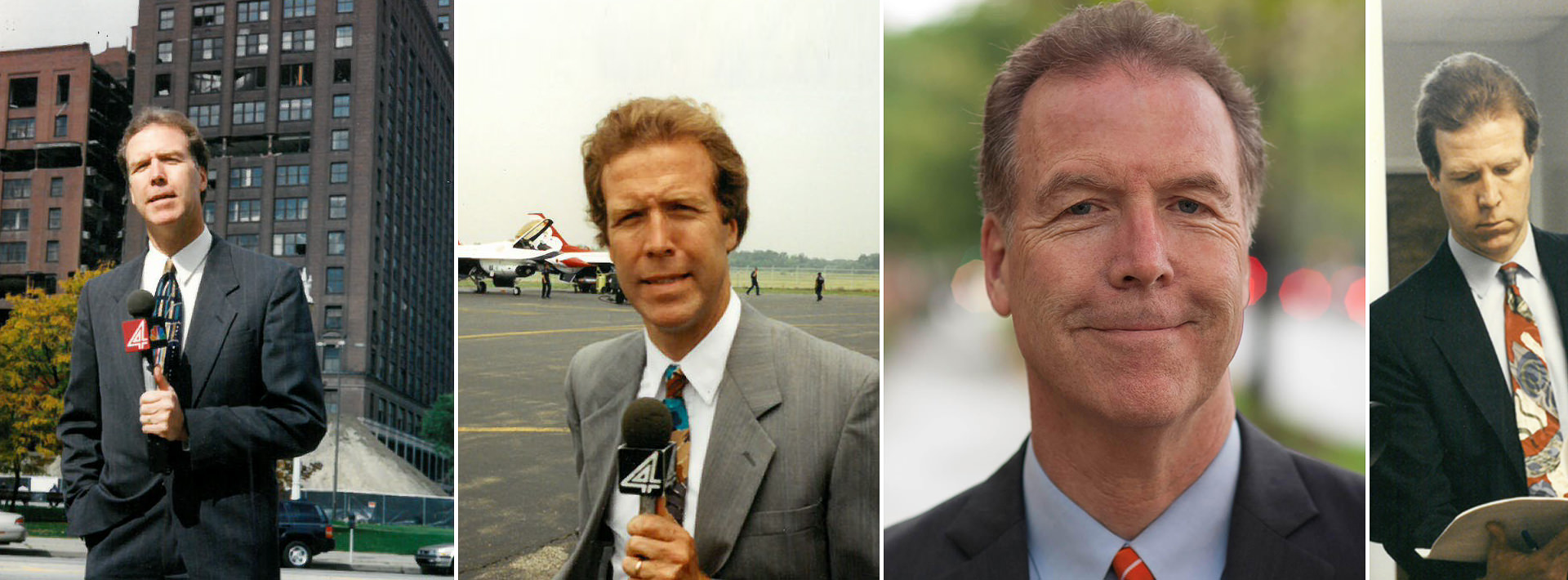A veteran newsman
Alumnus Roger Weber hangs up his microphone after 37 years in Detroit TV

By Kurt Anthony Krug
Veteran news reporter Roger Weber ‘73 was astounded when his colleagues at Channel 4 in Detroit presented him with the Roger Weber Award on his final day.
“When I heard that, I thought, ‘You’re doing what?’” said Weber, of Farmington Hills, Mich. “It’s for journalistic standards. Every year they will have a winner of the award named after me. That is such an honor.”
Weber joined Channel 4, one of the nation’s top-rated NBC affiliates, in 1978—the same year he married his wife Corinna, with whom he has two children—and remained there until his retirement in late June, 2015 after a career spanning more than 40 years.
“At some point, you’ve got to stop and smell the roses and enjoy life in this wonderful state,” said Weber. “A TV station’s daily schedule can be pretty tiring. Coming home, dinner’s at 7:15 p.m. or so. Corinna has her own job and she’d love to eat when she gets home, but she’s waiting for me, bless her heart. I’m married to a great lady, and we want to do things together.”
Weber’s interest in journalism began during high school in the late 1960s.
“People forget how crazy times were in the 1960s. In 1967, there were the riots in Detroit. In 1968, there was the Democratic convention where you had all the arrests in Chicago…the assassinations of Robert F. Kennedy and Martin Luther King, Jr. It really was a turbulent time,” said Weber.
The Salem, Mass., native grew up in Stoney Ridge, Ohio, located several miles from BGSU, which is renowned for its journalism program. There, he worked at WBGU-TV from 1969-73 as a floor assistant, audio technician and videotape operator. During his junior year, he worked in front of the camera, putting on a daily local newscast and a weekly political program called “Ohio This Week” that ran on several Ohio PBS stations.
“I had wonderful professors, including Jay Black, Emil Dankser, Joseph Del Porto, Robert Clark and Hal Fisher. The fact that I remember their names 42 years later speaks to their impact on me. Dansker demanded clear, concise writing, and drove the point home by covering my news copy in red ink. I’ve always taken pride in my writing, and I thank him for laying the foundation. After taking classes, I would report for duty at WBGU. The job gave me a chance to apply what I was learning in the classroom. Writing on deadline and being on live television was a great experience,” he said.
Weber was also a student coordinator at Darrow Hall, BGSU’s first co-ed residence hall.
“In 1972, a group of us traveled to Purdue University to see their football team host the Falcons. It was a David vs. Goliath battle, but we pulled an exciting upset. Earlier that year, Dave Wottle won Olympic gold in the 800 meter run. We were so proud of him,” Weber fondly recalled.
After graduation, he worked at Channel 13 in Toledo, Ohio, where he met Corinna. From there, he went to Channel 4. He’d later teach journalism at Oakland University in Rochester, Mich.
While at Channel 4, Weber covered numerous stories that impacted the nation, including the trial of physician-assisted suicide advocate Jack Kervorkian, Detroit’s bankruptcy, et al. He praises Channel 4 for letting him do longer-form stories that are off the beaten path: the statues of Detroit, Lenten fish-fries, and a man who writes 20 postcards to his friends daily.
“These are stories I like,” he said.
Weber’s glad to be retiring on his own terms, when people don’t want him to leave.
“I’m proud that I didn’t just coast to retirement or take it easy—I was working hard right to the very end,” said Weber. “I will miss my colleagues, the people that I cover, sources I’ve become close to, Most of all, I’ll miss the creative process of telling a story on television. When you have the perfect marriage of words and video in a television story, and you communicate something clearly and concisely in an interesting way that has impact, that’s a rewarding experience. Not every story you do is an Emmy-winner because there’s plenty of run-of-the-mill stories that you try to make as special as you can. But when that rare story comes along and you’re like, ‘Man! I was so glad that I could share that with people’ – that’s a wonderful feeling.”
Updated: 02/24/2020 10:07AM
